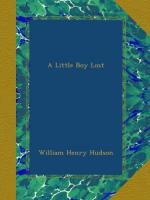Your request for a Foreword to insert in the American reprint of the little book worries me. A critic on this side has said that my Prefaces to reprints of my earlier works are of the nature of parting kicks, and I have no desire just now to kick this poor innocent. That evil-tempered old woman, Mother Nature, in one of her worst tantrums, has been inflicting so many cuffs and blows on me that she has left me no energy or disposition to kick anything—even myself.
The trouble is that I know
so little about it. Did
I write this book? What
then made me do it?
In reading a volume of Fors Clavigera I once came upon a passage which sounded well but left me in a mist, and it relieved me to find a footnote to it in which the author says: “This passage was written many years ago and what I was thinking about at the time has quite escaped my memory. At all events, though I let it stand, I can find no meaning in it now.”
Little men may admire but must not try to imitate these gestures of the giants. And as a result of a little quiet thinking it over I seem able to recover the idea I had in my mind when I composed this child’s story and found a title for it in Blake. Something too of the semi-wild spirit of the child hero in the lines:
“Naught
loves another as itself....
And, father, how
can I love you
Or any of my brothers
more?
I love you like
the little birds
That pick up crumbs
about the door.”
There nature is, after picking
up the crumbs to fly
away.
A long time ago I formed a small collection of children’s books of the early years of the nineteenth century; and looking through them, wishing that some of them had fallen into my hands when I was a child I recalled the books I had read at that time—especially two or three. Like any normal child I delighted in such stories as the Swiss Family Robinson, but they were not the books I prized most; they omitted the very quality I liked best—the little thrills that nature itself gave me, which half frightened and fascinated at the same time, the wonder and mystery of it all. Once in a while I got a book with something of this rare element in it, contained perhaps in some perfectly absurd narrative of animals taking human shape or using human speech, with such like transformations and vagaries; they could never be too extravagant, fantastic and incredible, so long as they expressed anything of the feeling I myself experienced when out of sight and sound of my fellow beings, whether out on the great level plain, with a glitter of illusory water all round me, or among the shadowy trees with their bird and insect sounds, or by the waterside and bed of tall dark bullrushes murmuring in the wind.
These ancient memories put it in my mind to write a book which, I imagined, would have suited my peculiar taste of that early period,




